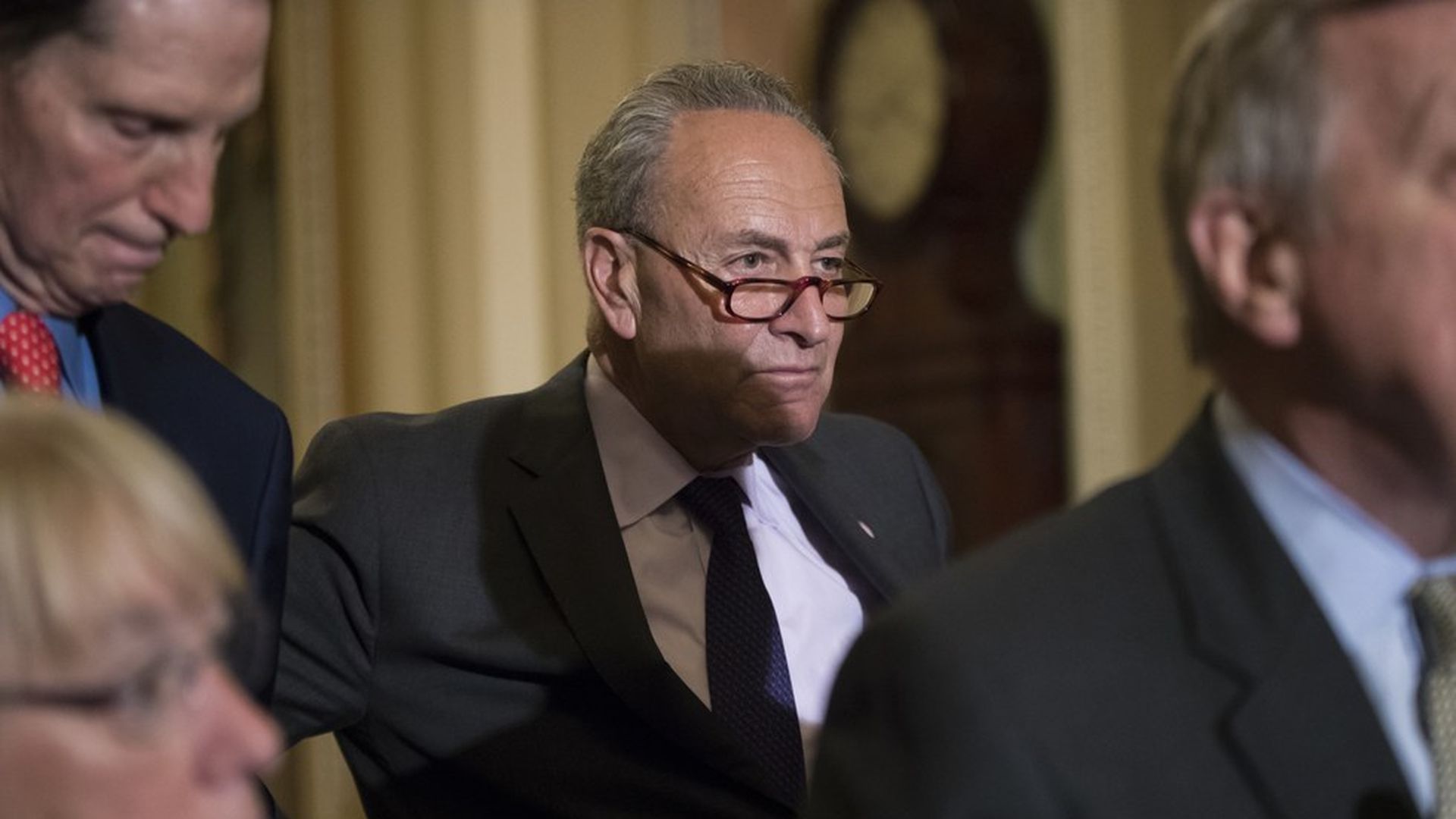What's next for Democrats on health care
Add Axios as your preferred source to
see more of our stories on Google.

(J. Scott Applewhite / AP)
Democrats have big decisions ahead of them now that the GOP's health care effort has failed. In the short term, it should be easy for them to unite around an Affordable Care Act stabilization package, like the one Sens. Lamar Alexander and Patty Murray will try to negotiate next month.
But the party has yet to answer the question of what comes next. Some strategists expect Democrats will consolidate around some form of single payer by 2020, though others won't concede that as a given. The problem: most people don't think a single payer system has a shot at becoming law anytime soon, and playing to the party's base may ignore real concerns about affordability.
Why this matters: Democrats have a unique opportunity to emerge as the adults in the room after the GOP's repeal and replace debacle. But they could squander it if they blindly defend the ACA without addressing its shortcomings, or if they jump into political arguments over single payer. Voters have been clear about what they want, and so far neither party has offered a real solution.
Short term: It's pretty clear that if a health care bill materializes next month, it's going to be aimed exclusively at stabilizing ACA exchanges. That's likely to mean funding insurer cost-sharing subsidies, extending reinsurance and adding whatever flexibility measures Republicans can negotiate into the deal.
- It's hard to see Democrats bucking the deal too much when its primary goal is to prop up their own law, and the policies being discussed are accepted by the health care industry as the best way to do so.
- "I would assume if Sen. Alexander and Sen. Murray work out a deal, most if not every Democrat would agree to it," said Jim Manley, a former aide to Harry Reid. "I think most Democrats see the need for a two-prong strategy here to deal with the immediate issues while leaving the larger debate for the future."
About that larger debate: It's just starting to heat up, and the trendy topic du jour is definitely single payer. "I'd be surprised if it wasn't in the next platform," Manley said, saying the party is done with minor modifications of the health care system and ready for a more comprehensive program than the ACA.
- But that is just a vague concept, still with little definition. There's a lot of ways to write a single payer plan.
- It's also surely not the favored policy of conservative and moderate Democrats, who have offered milder policy ideas lately. There's a reason the ACA is built on private insurance: As recently as eight years ago, nothing more liberal than that could get the votes to pass.
- The legislation currently put forward by Democrats includes a broad range of ideas: simple stabilization fixes by Democrats like Sens. Claire McCaskill and Tim Kaine, a Medicare buy-in for people 55 and older, and Rep. John Conyer's Medicare-for-all bill.
- The fact that there are varied plans on the table is a good thing and shows Democrats are serious, Jesse Ferguson, a Democratic strategist working on health care, told me. "It dispels the cynicism that voters gained watching Republicans oppose but never propose, because Democrats are making clear that we have a variety of substantive ideas for how to continue expanding coverage and lowering costs."
A warning: While the GOP's repeal efforts proved how popular the ACA's consumer protections are, there's no doubt about whether voters are feeling the pain of high out-of-pocket and prescription drug costs. They are, and not just in the individual market. If Democrats don't directly acknowledge and address affordability issues, it's to their own peril.
I spoke about this at length with Chris Jennings, a Democratic health care consultant who advised Hillary Clinton last year (who made affordability one of her major health care themes). He offered some frank advice to his party.
- "I know everyone wants to focus on, do you shift quickly to single payer or don't, but what I think we need to do as a party is recognize the issue that really drives the health care debate isn't particular system structures, but outcomes of affordability and access," he said.
- "We are making a huge mistake if we don't say that there's more to be done or we suggest the Affordable Care Act is the end all be all, that it's addressed the public's concerns on health care. It certainly has not. I think the base of our party is right to assert that," he continued.
- Zinger: "There's not much of a cost-containment caucus in Washington, but across the country, there is…Someone is going to ride that wave, both into the White House and into the Congress."
